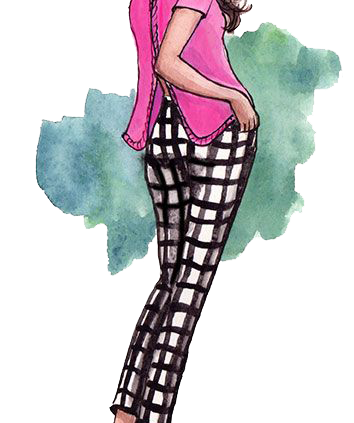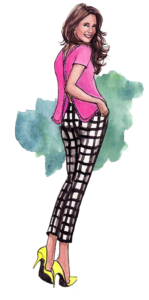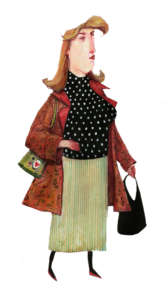I had become invisible. Or, if visible, not as welcome a sight as I once was.
It happened quite by chance, this new realization!
At a business event, growing bored, I did what I always do and inserted myself between two chatting people, who happened to be men, and proceeded to kind of flirt by default. My clever banter descended into a one-sided grilling (me asking questions and they providing answers) until one guy said to the other, “So, are we heading to that other party now or what?” Like in, get me out of here.
There it was.
Whoosh, like Alice plunging down the rabbit hole, I was suddenly not the fun girl at the party but the auntie figure we humor for a moment before moving on. And at the same time, miraculously, I had become her age opposite, I was transported back in time to my nerdiest moment of high school, horrified that I’d made a fool of myself.
Really, teen age (with its insecurities and greasy skin) and middle age (with its sags and wrinkles) are both marked by waves of hormones, mood swings and hyper-awareness of appearance, the bookends around that all-too-brief lull called young adulthood.
I recalled a conversation I’d had with a good friend who was saying that at “our age” (let’s delicately call it middle age, suggesting we will live to 100) we are invisible. As older women we are no longer desirable, no longer perceived as anything but taking up space a younger person could put to better use in the job, in the relationship, in life.
I thought she needed to up her meds. Certainly, she should speak for herself: I for one was not invisible.
Until suddenly I was. And this was the dreaded day. Age, I now realize, doesn’t creep up, it knocks you around with changes you didn’t see coming. And it happens at around 50. Where had I gone?
Did I disappear, and get replaced by a frumpy and forgettable woman?
How could I have gone from this,
to this so quickly?
If there is any good news for those of us embarking on the middle and plus years now, it is that the boomers have prepared the path, as they always have.
Magazines like Cosmo and More have softened the blow by reporting on sex, relationships and health, with pictures of the none to young to match — though More does insist on mentioning age an awful lot – “Updo’s That Won’t Age You!” ugh! That and much more just like that on fashion, make-up and life style having the effect of never letting us forget we are now of that certain age.
Because boomers have done nothing if not dictate shifts in outlook, popular culture has become kinder than they used to be to older women, who now thankfully appear as strong, elegant and often wonderfully dressed characters on television and in the movies.
That’s all to the good, but it doesn’t change how it feels to see blankness staring back at you where something like admiration was once evident.
Getting older signals the loss of a certain kind of power. Luckily for every action there is an equal and opposite reaction. The wolf whistles may have stopped but, if I am to be honest, I’m grateful for the silence — there was a kind of invisibility associated with that as well.
I didn’t feel especially visible or appreciated for my finer points when I was in my 20s and 30s and a man I’d hoped would do business with me, instead asked me to “go to bed” with him. Silly me, thinking the interest was professional. While it might have been easier to chat or be chatted up at a party, the more common thought was not “Wow, she’s smart” but rather “Will she or Won’t she?”
There is also a serenity that’s evident despite the unpredectable hormones of pre- or full-on menopause.
“In my youth I was ruled by hormones, but in a different way,” says a frequently flushed friend of 57. “I was always madly in love or in heart-wrenching despair at lost love or otherwise lusting after someone. My libido has quieted. My life isn’t so fraught.”
Still, it seems despite the fact that we boomers are aging in droves, ageism is alive and well in the workplace, at least according to anecdotal reports. And this is true for both sexes — an out of work male creative director in his 50s (youngish for a man) complained to me that more doors shut than opened to welcome his vast experience — the thinking being that it takes one to know one and the target demographic for most advertising is a sweet spot of people ages 18 to 35. Ridiculous, because rarely does the big money being spent come from that very young age group.
And my flushed friend, who is currently looking for a job, doesn’t want potential employers to know how old she is: “I have to leave as many jobs off the resumé as I put on it, just to keep it from looking like I am an old broad.”
When I was revising my own resumé with the help of a professional , I was advised to leave off some of my early businesses experience for the same reason — I would seem too old.
My early career is marked by memories of being terrified – “fake it till you make it, a sentiment that is now thankfully gone.
Experience feels a lot better than winging it, confidence is better for your system than bravado. Business associates and employers may be slow to acknowledge the value of experience until inexperience bites them in their soon-to-be sagging butts.
Aging undeniably means the loss of a certain kind of power. But the power of youth is a temporary gift, often clumsy and misunderstood. Being young and/or attractive is a given, but not earned.
I was shocked to realize I suddenly didn’t have that power of youth. Not quite sure what would replace it, I panicked. Now I know it has been replaced with a power that is subtler and stronger.
Is this how you feel, that you too have more power… or ?
Let me know what you think and share your own experiences with us here at YourBFFsays.com
Here’s to ‘Still Being SEXY At Seventy’.





Leave a Reply
Want to join the discussion?Feel free to contribute!